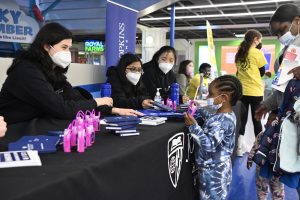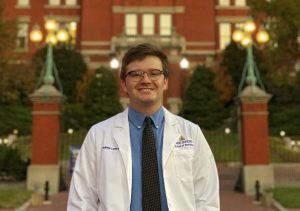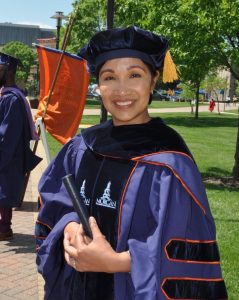Johns Hopkins UniversityEst. 1876
America’s First Research University
During the earliest, perhaps most confusing weeks of COVID-19, teachers from Baltimore City Schools began reaching out to Panagis Galiatsatos, MD, MHS, a pulmonary care specialist at Johns Hopkins Medicine. As the co-founder of Hopkins’ Medicine for the Greater Good, a program that “brings the hospital to the community,” by dispatching health care professionals to schools, churches, and community centers throughout Baltimore, Galiatsatos was a familiar face, someone the students could trust to give them straight answers about the virus that had suddenly upended their lives.
So, in April and May of 2020, Galiatsatos joined a few remote classrooms, doing his best to explain the burgeoning scientific response to COVID-19, dispelling the misinformation swirling around social media and answering students’ most pressing questions about the pandemic.

“Of course, that teacher told this teacher, and then that teacher told this teacher,” says Audrey Johnson, the director for economic innovation and strategy at the Johns Hopkins Office of Economic Development and Community Partnerships (OEDCP).
Soon, Galiatsatos reached out to Alicia Wilson, vice President for the Office of Economic Development and Community Partnerships — as well as colleagues in the schools of Medicine, Nursing, and Public Health — to see how they might formalize this type of outreach. “We came together and we thought — we really have something here,” Johnson remembers.
That something turned into the Johns Hopkins HEAT (Health Education and Training) Corps, a COVID-19 curriculum for K-12 students that consists of a 30-minute lecture followed by a 15-minute Q&A session, delivered virtually by trained volunteers from across the Hopkins health care spectrum — everyone from pre-med undergrads to PhD candidates in epidemiology. At first there were four lessons in the curriculum, but as the pandemic stretched on, the program expanded to include eight lessons.
While the subject matter of each lesson has evolved to keep pace with our current understanding of the virus (the team meets every Friday to discuss updating course materials), tried-and-true topics include how the virus spreads, how doctors treat COVID-19 infections, how vaccines work, and what effect a global pandemic can have on an individual’s mental health.
The program is funded with annual contributions of $200,000 from Johns Hopkins University and $100,000 from Hopkins Health System. Thanks to its virtual format, the curriculum has been implemented in classrooms far and wide. According to Meghan Brown, HEAT Corps program manager, volunteers have presented lessons in 19 states, the District of Columbia, and six countries.
Back in Baltimore, in July 2021, the program received a two-year, $300,000 per-year grant from the Baltimore City Health Department to deliver the curriculum across the city’s entire public school system.

For Andy Lancaster, a third-year medical student at Hopkins and HEAT Corps volunteer instructor originally from Crozet, Virginia, the chance to connect with his new community has been the best part of participating in the program. “Getting meaningfully involved in one’s community is a huge part of what it means to be in health care,” Lancaster said. “How can you serve your community if you don’t know them? You have to go and meet them in their environment, in their spaces, in their classrooms (virtually, in this case).”
Edralin Pagarigan, a science teacher at Golden Ring Middle School in Northeast Baltimore County, explained that instructors like Lancaster not only provide clarity to students about issues surrounding COVID-19, they may also influence their career path. “They’re exposed to people in the medical field,” said Pagarigan, who manages the school’s magnet program in health sciences, “providing pathways to think about their future beyond school.”
Pagarigan also noted that the COVID-19 curriculum encourages kids to think critically and engage with increasingly sophisticated ideas. “At first, their question might be ‘why do I have to wear the mask?’” she said. “But by the end of the course, the question is ‘why did the state remove the mask mandate?’”

Another impact of the program has been a more open dialogue about emotional well-being, a topic a traditional science course on COVID-19 may not cover. After completing the curriculum, students are asked to give feedback and many of them comment on what they learned about caring for their mental health during the seemingly endless pandemic. “It’s okay to feel, and to talk about those feelings,” one student in Pagarigan’s class wrote. “It’s important to put yourself first sometimes,” said another.
Pagarigan estimates that more than 900 students have successfully completed the curriculum, and Golden Ring Middle has also hosted after-school virtual town halls so that students from other schools as well as adults in the community could take part in the courses.
HEAT Corps has been so successful, that recently the OEDCP began brainstorming other ways to deploy this same model. Johnson says those plans were fueled by questions like: “What are the health issues, what are the challenges that K through 12 is dealing with right now?”
To that end, HEAT Corps will begin offering new curricula in the fall of 2022, one program focused on mental health and another on e-cigarettes and vaping.
While the topics will be different, Johnson said, the goals will be the same. “We want to help them be educated and equipped with information that will allow them to advocate for their own health and keep their community safe.”
Topics: Faculty and Staff, Foundations, Johns Hopkins, Strengthening Partnerships, Support Scholars